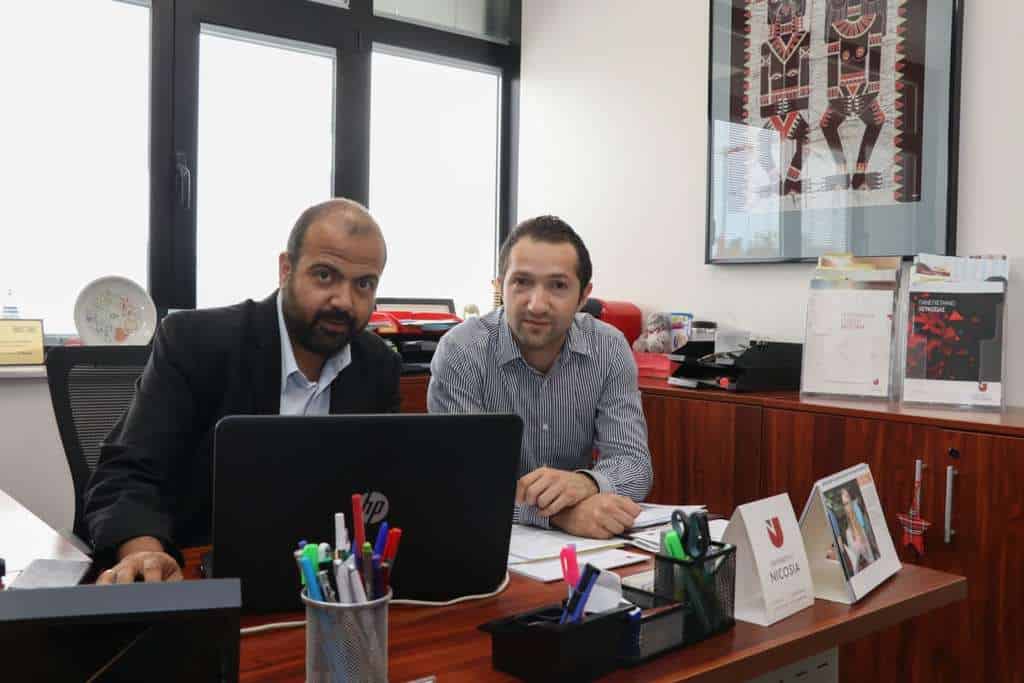
Photo: Dr Kyriakos Felekkis (left) and Dr Christoforos Giannaki (right)
Dr Kyriacos Felekkis joined the University of Nicosia in 2011 and is currently Head of Department of the Department of Life and Health Sciences at the School of Sciences and Engineering of the University of Nicosia. Over the course of our conversation, it quickly becomes evident that he is not a fan of standing still. Indeed, he is driven by the pursuit of new knowledge and opportunities, all while maintaining a friendly and easy-going demeanour. He believes that a society without research and innovation is destined to remain indolent.
Dr Kyriacos Felekkis received his BSc in Biotechnology from Worcester Polytechnic Institute, MA, in 2000. Following this, he went on to obtain a degree in Pathology and Laboratory Medicine from Boston University School of Medicine, MA, in 2004. In 2004, he joined the Department of Biological Sciences at the University of Cyprus as a postdoctoral fellow and later as a Scientist. When contemplating his decision to pursue a career in academia, Kyriacos notes that an academic career combines the development of new knowledge research, the transfer of this knowledge through teaching and the contribution to the society. As such, you can never get bored!
Kyriacos’ research interests on the study of the molecular basis of human diseases. Along these lines, he is interested in the role of novel molecules, called microRNAs, in disease development and evolution. In addition, his research group is involved in biomarker discovery for early disease diagnosis and disease monitoring. They are currently working with renal diseases and cancer.
When asked to describe what inspired his interest in this field, Kyriacos notes that he was always fascinated with the study of human diseases. He explains, “I feel that this scientific area is the “most applied” in the field of Biomedical Sciences. Working and understanding the nature and origin of human diseases is very fulfilling as you contribute to the improvement of human life.” He goes on to explain that scientists do not usually experience the immediate satisfaction that clinicians receive when treating patients. As a result, this field of research is the closest that an individual can get to that feeling of and even more satisfying given that one’s contribution to the filed can go a long way to helping many people.
Speaking about the current important topics or big questions occupying researchers in his field, Kyriacos explains that many human diseases are still incurable. Cancer, neurodegenerative diseases, autoimmune diseases and many others make up this list. In order to tackle these diseases, you must combine the expertise of multiple disciplines including biology, computer science, AI, bioengineering, others. Thus, Biomedical Research is moving in this direction, where various disciplines join forces and advanced technologies to address those crucial areas.
Kyriacos is currently coordinating an EU-funded Horizon2020 project (OActive) together with a colleague, Dr Christoforos Giannaki. This flagship project proposes the development of computer models for the diagnosis and treatment of (OA). The consortium includes 13 partners from different European countries and combines computer, augmented reality, engineering and biological approaches to the fight against OA. He is also the co-Principle Investigator of an internally funded project, which examines the role of miRNA from ingested bovine meat to the development and progression of colorectal cancer.
Flash Five
- What motivates you to come to work on a daily basis?
My work, my colleagues, my students, my family.
- What are the favourite and least favourite aspects of your work?
The fact that there is a great deal of multi-tasking that comes with the job. There are always new projects, new challenges, and new directions to pursue. In terms of the least aspect, I would say the levels that need to be managed. Especially if you suffer from the “YES” syndrome and can never turn down a challenge!
- Do you have any role models?
There were so many people who inspired me both in my personal and professional life. It would not be proper to name just a few.
- What do you enjoy doing during your free time?
Music, reading, gardening, and cooking.
- What advice would you give to aspiring academics and researchers in your field?
Keep trying. This field is not easy at all and involves more disappointment than satisfaction, especially in your early years. Never give up and you will be rewarded.
Recent Publications
-
Felekkis K. MicroRNAs and Aging: Biomarkers or Therapeutics Targets? Curr Aging Sci. 2017;10(2):80-82.
-
Dweep H, Kubikova N, Gretz N, Voskarides K, Felekkis K. Homo sapiens exhibit a distinct pattern of CNV genes regulation: an important role of miRNAs and SNPs in expression plasticity. Scientific Reports, 2015 Jul 16;5:12163.
-
Dweep H, Gretz N, Felekkis K. A schematic workflow of collecting information about the interaction of copy number variants and microRNAs with existing resources. Methods Mol Biol, 2014; 1182:307-320.
-
Dweep H, Georgiou GD, Gretz N, Deltas C, Voskarides K, Felekkis K. CNVs-microRNAs Interactions Demonstrate Unique Characteristics in the Human Genome. An Interspecies in silico Analysis. PloS ONE, 2013; 8(12):e81204
-
Papagregoriou G, Erguler K, Dweep H, Voskarides K, Koupepidou P, Athanasiou Y, Pierides A, Gretz N, Felekkis KN, Deltas C. A miR-1207-5p binding site polymorphism in HBEGF gene is associated with disease severity in CFHR5 glomerulonephritis, PloS ONE, 2012;7(2):e31021. (co-corresponding author)
-
Felekkis KN, Voskarides K, Dweep H, Sticht C, Gretz N, Deltas C (2011).Increased number of microRNA target sites in genes encoded in CNV regions. Εvidence for an evolutionary genomic interaction. Molecular Biology and Evolution, 28(9):2421-4.
